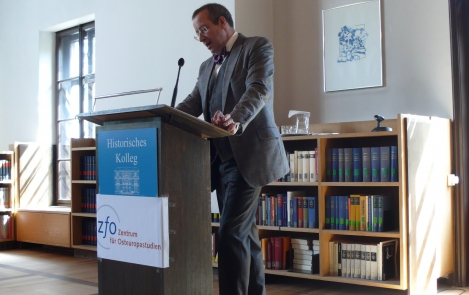-
Reset
+


President Ilves: the division of the European Union into East and West is about to end
29.04.2011
“The division of the European Union Member States into new and old or East and West is no longer as simple as it used to be ten years ago. The approach to Europe is changing, as the situation has changed – largely because of the recession that has hit the world and, above all, the European Union,” said the President, Mr. Toomas Hendrik Ilves, in his presentation discussing the new and old Europe in 2011, which was delivered to students at Ludwig-Maximilian University.
When we look at the national debt, national budget deficit and general economic indicators of the European Union Member States, we can see that the post-communist countries of the EU have responded to the economic crisis more powerfully than the so-called old Europe, stated the Estonian Head of State.
President Ilves suggested a new approach in which the former division of countries into the rich westerners, untouched by communism, and poor eastern Europeans, from the former Soviet block, into the West and the East is to be replaced by a division according to responsible financially policy.
However, President Ilves emphasised that budget policy related responsibility only depicts a part of the general picture, if such an approach is used.
“Similarities can be identified between certain countries in a number of spheres; however, there will also be differences between groups of European countries. Such an identification and distinction will reveal, slowly yet surely, gaps in development levels, which were forced on Europe by the Cold War with its gaps, which allowed part of Europe to enjoy economic growth for fifty years while the other part of Europe stagnated,” President Ilves admitted.
The Estonian Head of State stated that while the situation changes, certain perceptions are hard to eradicate in Europe.
“The old Member States, for example, are receiving agricultural subsidies three times as large as those available to the new Member States under the Common Agricultural Policy, while the market is the same. We all participate in the same internal market, where the price of seed, agricultural machinery and fuel is the same for everyone; however, a part of Europe is getting three times more money,” President Ilves said.
“I do believe that the more people who understand that circumstances are changing and stereotypical concepts are being overcome, the more people will benefit,” the Estonian Head of State, Mr. Ilves, added in his presentation, which was delivered to students at Ludwig-Maximilian University.
The event was organised by the Zentrum für Osteuropastudien Research Institute of Munich University. Students of history, political science and East-European studies as well as Fenno-Ugristics and students of the university attended the speech of President Ilves, which was followed by a discussion on the subject of the past and future of Europe.
Today, President Ilves will meet with the Minister of Economic Affairs, Dr. Martin Zeil, and will take part in a panel discussion at a conference dedicated to the 60th anniversary of Radio Free Europe.
Office of the President
Public Relations Department
Phone +372 631 6229




